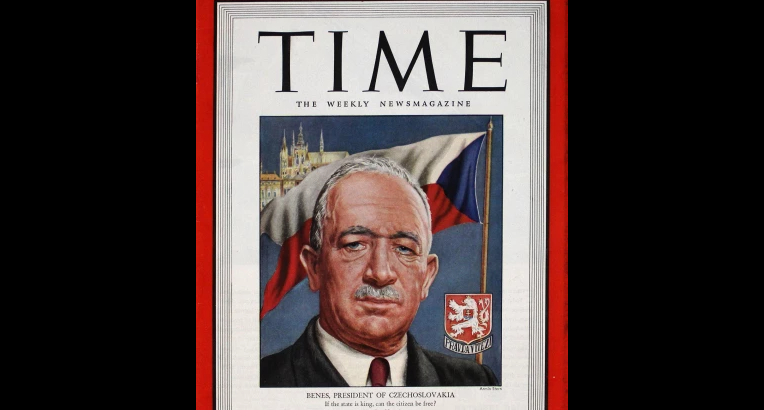Edvard Beneš was born May 28, 1884, in Kozlany, Bohemia during the rule of the Austro-Hungarian Empire. He graduated with a doctorate degree in Law first in Dijon in 1908 and another in Prague in 1909, where he then taught for three years at the Prague University of Commerce. Having become influenced by Tomáš Masaryk and his desire for a free and independent nation for the Czechs and Slovaks, Beneš joined with Masaryk and Milan Štefánik in forming what would eventually become the Czechoslovak provisional government on October 14, 1918. In the aftermath of the Great War, and the subsequent collapse of Austria-Hungary, the state of Czechoslovakia would be born with Tomáš Masaryk as its first president and Beneš as its foreign minister.
Edvard Beneš (right) with Tomáš Masaryk (left)
During his time as foreign minister, Beneš served as the council chairman for the League of Nations six times and worked hard to reestablish a balance of powers in eastern Europe, creating what would be known as the “Little Entente” with Romania and Yugoslavia in 1921. The intention of this alliance, originally oriented against Hungary, focused its attention on Germany instead when France joined in 1924.
Edvard Beneš with leaders of the Little Entente, 1936
Succeeding Masaryk as president of Czechoslovakia in 1935, Beneš was faced with the threat of Germany, something he was all too familiar with during his time as the Minister of Foreign Affairs. Despite his best efforts to resolve the issue surrounding the Sudetenland, he was not successful in avoiding the inevitability that would be the Munich Agreement, which would see Hitler appeased. Pressured by European great powers, Beneš’s Little Entente had no choice but to back down and relinquish the Sudetenland. Following that, in 1938, Beneš resigned from his position as president and went into exile. This was not, however, the end for Beneš.
When the Second World War broke out, despite “appeasement,” Beneš set up a government-in-exile for Czechoslovakia in France, which he would later move to London in 1940 after France fell. During the war, Benes worked with Frantisek Moravec and the Czech resistance in occupied Czechoslovakia on a plan that would lead to the assassination of the high-ranking Nazi official named Reinhard Heydrich in what was known as Operation Anthropoid. Though the operation was a success, the consequences were brutal and lead to the destruction of the towns of Lidice and Ležáky. Eventually, the war was won by the Allied forces, and Czechoslovakia was freed from German occupation. Beneš returned to his homeland in 1945, where he served his second term as president.
Edvard Beneš returning to Prague, 1945
As part of his presidency in post-war Czechoslovakia, Beneš instituted what was called the “Beneš decrees,” which stripped the Germans living in the country of their citizenship and confiscated their property, forcing them out of the nation along with the Hungarians. Unfortunately for Beneš, his time as president was not smooth sailing. The growing influence of the Soviet Union in Eastern Europe led to Czechoslovakia having to cooperate with them and in turn led to the growing power of the communist party in the nation. With Beneš suffering from two strokes in 1947 and becoming increasingly ill, communist prime minister Klement Gottwald swooped in to demand a communist-dominated cabinet, leading in turn to a communist-dominated government in 1948. Faced with this and refusing to sign the new constitution they had established, Beneš resigned from his position as president on June 7, 1948, a position that Klement Gottwald took in his place. Three months later, Edvard Beneš died of his illnesses at his villa in Sezimovo Usti, where he was subsequently buried.
Written by James Travis
Citations:
Britannica, T. Editors of Encyclopaedia. "Edvard Beneš." Encyclopedia Britannica, August 30, 2022. https://www.britannica.com/biography/Edvard-Benes.
Burns, Tracy A. “Edvard Benes - Czechoslovak Statesman.” Private Prague Guide, 2023. https://www.private-prague-guide.com/article/edvard-benes.
“Czech Presidents, Edvard Benes.” Livingprague.com, 2023. https://livingprague.com/politics-and-history/edvard-benes-president.
Küpper, René. “Beneš, Edvard.” 1914-1918-online: International Encyclopedia of the First World War, Eds. Ute Daniel, Peter Gatrell, Oliver Janz, Heather Jones, Jennifer Keene, Alan Kramer, and Bill Nasson (Freie Universität Berlin, Berlin, 2014.)
DOI: 10.15463/ie1418.10077.




